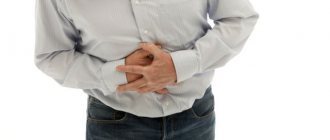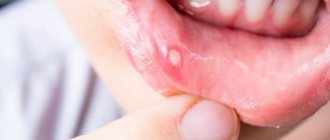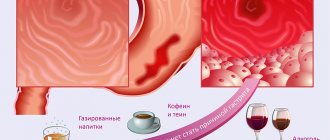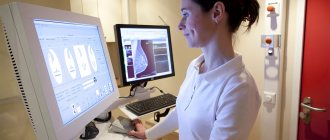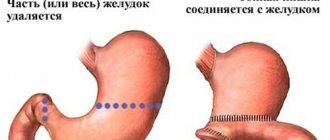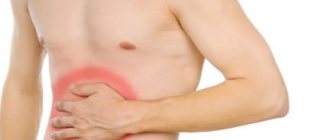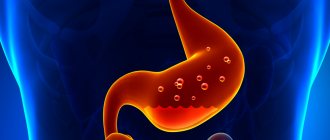Factors in the development of gastroduodenitis and classification
The disease, regardless of the causes that cause it, develops according to a specific scenario - the influence of any factors on the mucous membrane of the affected organs, inflammation, loss of integrity.
When the mucosa is damaged, it cannot produce the required amount of substances important for digestion, plus motor function is impaired. The smooth muscles of the organs do not work correctly, which prevents the proper mixing of food with gastric juice. In particular, with gastroduodenitis, motility increases. Gastroduodenitis and gastritis are the most common gastrointestinal diseases, and in some cases the cause of their occurrence is poor nutrition. It is classified as one of the so-called exogenous factors that affect the digestive system from the outside. Malnutrition in the gastroenterological sense includes the consumption of spicy, cold, hot foods, smoked foods, fried foods, and canned food.
Exogenous (primary) factors also include:
- Chemical-toxic effects - non-steroidal anti-inflammatory drugs and drugs that irritate coolant, alcohol, pesticides.
- Entering the body of the bacterium Helicobacter pylori - the bacterium penetrates the gastric mucosa and begins to actively reproduce, causing inflammation, damage and painful symptoms. A person whose stomach is colonized by a bacterium is its spreader. Gastritis and gastroduodenitis caused by this problem have a higher risk of progressing to the cancerous stage. The most common cause, about 80% of all cases of gastroduodenitis are provoked by it.
- Bacteria other than Hp.
- Smoking.
- Radiation.
- Parasites.
- Mushrooms.
- Stress.
Endogenous (secondary) causes include the following:
- increased acid formation;
- reduction in the amount of mucus;
- change in the amount of secreted hormones;
- problems related to the biliary tract and liver;
- pathology of the endocrine system;
- autoimmune damage to the mucous membrane (10-15% of all diseases) - antibodies attack their own cells, the likelihood of developing cancer increases by 3-6 times.
Depending on the reasons for which gastroduodenitis was provoked, it manifests itself in different types of abnormalities and inflammation. There are five main types:
- superficial - the mucous membranes of both organs affected by the disease are damaged, but to a small extent and without erosion;
- erosive – the mucous membrane has succumbed to destructive factors;
- hypertrophic - one of the types of manifestations when the mucous membranes thicken and grow;
- atrophic - the reverse type, when the mucous membranes become thinner, and the glands contained in the walls of the organs produce less and less acid necessary for digestion;
- mixed - when several types of the above are combined with each other.
There are also special forms of the disease, provoked by some nonspecific factors that we mentioned above. For example, radiation gastroduodenitis is caused by radiation.
Additionally, when classifying gastritis, the level of acidity (normal/increased/decreased), stages (remission, acute stage), and the presence of complications are assessed. Bleeding or malignancy are observed as complications. In addition, gastroduodenitis can be acute and chronic.
Gastroduodenitis
Treatment of severe gastroduodenitis should be carried out in the gastroenterology department. When an acute condition develops, one course of therapy and adherence to a strict diet are sufficient for complete recovery. Complaints about repeated episodes of the disease require repeated consultation with a gastroenterologist and full treatment.
A patient with gastroduodenitis must be prescribed a therapeutic diet. During periods of exacerbation, special rules must be observed: food must be mechanically, chemically and thermally gentle. You should not consume spicy, smoked or extractive substances. During the period of remission, a special diet is not required; a healthy balanced diet is sufficient. To prevent relapses, it is recommended to permanently give up smoking, alcohol, carbonated drinks, and strong coffee.
Drug therapy for gastroduodenitis depends on the clinical form of the disease. For increased gastric acidity, antacids and proton pump inhibitors are prescribed; if it is low, use enzyme preparations and natural gastric juice. Detection of Helicobacter pylori infection requires the mandatory prescription of antibacterial drugs, which, in combination with bismuth drugs and proton pump inhibitors, can achieve almost complete eradication of the pathogen. Also, complex therapy should include antispasmodics, reparative drugs, and herbal medicine. During the period of remission, sanatorium treatment and drinking mineral waters are recommended.
The main problem in the management of gastroduodenitis is that many patients try to treat themselves, irrationally using symptomatic remedies, abandoning the therapy they started when the symptoms of the disease weaken, without achieving a complete cure. Correct and timely treatment of chronic gastroduodenitis is the best prevention of peptic ulcer disease. Even after achieving stable remission, constant adherence to the principles of rational nutrition and a healthy lifestyle is required to prevent relapses.
Forecast and prevention of gastroduodenitis
The prognosis for gastroduodenitis is favorable only with regular examination by a gastroenterologist and following his recommendations regarding proper nutrition and lifestyle. In patients who do not adhere to a diet and do not undergo the full course of treatment for exacerbations, chronic gastroduodenitis turns into gastric ulcer, which threatens a significant deterioration of the condition and serious complications.
Prevention of gastroduodenitis has many similarities with the basic principles of treatment. To prevent the disease, it is necessary to lead a healthy lifestyle, give up bad habits such as smoking and drinking alcohol, and drinking large amounts of strong coffee. It is necessary to eat right - include more fresh vegetables and fruits, cereals, lean meat and fish in your diet. You should avoid carbonated drinks, hot and spicy foods, and fried foods. These recommendations are the key to a healthy state and proper functioning of the digestive system.
Symptoms of the disease
An exacerbation of gastroduodenitis can occur unexpectedly in the form of an attack, when on an empty stomach after sleep, pain is felt in the upper abdomen (an attack and then relaxation, as during contractions), accompanied by nausea and vomiting. Chronic gastroduodenitis is manifested by regular aching pain, heartburn, and frequent vomiting. Symptoms may differ between children and adults.
The clinical picture depends on the stage of the disease - exacerbation or remission. The acute stage is characterized by intense pain, which can last up to two weeks; during remission, the patient does not feel any problems with digestion, but damage is visible on endoscopic examination. There is also an intermediate state - incomplete remission, when there is no pain, but the person continues to be bothered by bloating, heartburn, and heaviness.
The reasons for assuming a diagnosis after examination are weight loss, pallor of the skin, coating on the tongue and pain on palpation. Additionally, you can check yourself by examining the inner surface of your cheeks - dents from your teeth will be visible on it. The child experiences more symptoms and finds it difficult to tolerate them, which results in emotional suffering.
In general, the clinical picture for acute and chronic gastroduodenitis looks similar to the picture for a duodenal ulcer - the same three main syndromes are observed. Let's take a closer look at them.
Pain syndrome occurs during exacerbation and with chronic gastroduodenitis. The localization of pain depends on age - in adults it is observed in the area of the stomach and intestines, in children where the solar plexus is located or near the navel. Pain associated with periods of nutrition can be divided into 3 types:
- night pains - occur 4-5 hours after dinner, during sleep (if you eat, they will disappear);
- hunger pains - a person wakes up with them, but relief comes after breakfast;
- late pain - occurs when a lump processed in the stomach passes into the duodenum, which occurs after 1-3 hours.
What kind of pain the patient feels depends on the location of the inflammation - late pain is observed in patients localized in the stomach, at night and hungry in patients localized in the intestines. Late pain is difficult to deal with, but patients with localization in the intestines are “lucky”; they can relieve the symptom simply by eating. In addition to nutrition, pain can be caused by overexertion or stress.
Dyspeptic syndrome occurs due to the fact that food remains in the stomach for a long time (the muscles of the intestines and stomach do not work correctly) and enters the intestines at the wrong time. This syndrome includes heartburn, belching, nausea and vomiting, diarrhea + constipation in turn, heaviness, bloating, bitterness. Children, and sometimes adults, experience slipping syndrome, when the child goes to the toilet immediately after eating. If a child has high acidity, he or she will experience a symptom such as sweating.
And the last group of symptoms is collected in the category of asthenovegetative syndrome, which includes weakness, fatigue, lethargy, rare pulse, low blood pressure.
When to see a doctor: symptoms of gastroduodenitis
In the hustle and bustle, we do not pay attention to the alarm signals of the body, considering them the norm. But if the symptoms are repeated, you should see a doctor in order to exclude or identify the disease at an early stage.
Typical symptoms of gastroduodenitis include:
- Nausea, especially after eating
- Less frequent vomiting
- Bloating
- Pain in the navel or right hypochondrium
- Loss of appetite, up to complete aversion to food
- Difficulty digesting food - heaviness in the stomach, feeling of early satiety
- Sometimes - diarrhea
Diagnosis of gastroduodenitis
Treatment always begins with diagnostic procedures. For diagnostic purposes, several types of studies are used:
- endoscopic;
- histological;
- secretion assessment;
- antroduodenal manometry;
- fluoroscopy;
- Diagnosis of HP infection.
Endoscopic examination allows you to assess the condition of the walls. Using it, you can detect swelling, an increase in folds or, on the contrary, their smoothness, hyperemia (focal or diffuse), pallor of the mucous membrane, thinning.
Histology can confirm the conclusions that were made after examination with an endoscope. It assesses the degree of inflammatory and dystrophic processes - at what stage the disease is.
The intragastric pH-metry method is aimed at establishing the level of secretion. The pH level in the body of the stomach and its antrum, and the difference between these two indicators, is assessed. A normal reading indicates that the stomach sufficiently neutralizes the acid in the bolus of food before it enters the duodenum. Otherwise, acidification may occur. The indicators of both sections in the basal fraction (that is, normal) and after stimulation (histamine is administered) are also compared.
How is secretory function assessed?
- reduced if all indicators are reduced (in normal and stimulated states);
- increased if even one indicator is above normal.
In children, normal or increased secretory function is most often observed.
Since Hp infection is one of the main causes of gastroduodenitis, studies are carried out to search for it - histology and bacterioscopy. Antroduodenal manometry assesses gastric motor functions. For the same purpose, you can perform an EGG and ultrasound of the stomach filled with water. Fluoroscopy is usually used to distinguish gastroduodenitis from other diseases, such as pyloric stenosis or chronic duodenal obstruction.
Treatment
Treatment is carried out sequentially and includes the establishment of nutritional and physical activity and drug therapy. The method of treating gastroduodenitis is selected depending on the level of acidity. When Hp is detected, antibiotics cannot be avoided. Multivitamins, sedatives, antispasmodics, and mineral waters are also used. The doctor takes into account the peculiarities of the course of gastroduodenitis and the presence of other diseases of the digestive system.
NEARMEDIC offers comprehensive examination and effective treatment in comfortable conditions without queues and at reasonable prices. There are several branches located in Moscow and the cities of the Moscow region, so you can choose the closest and most convenient one. Our advantages:
- a full range of equipment for ultrasound, colonoscopy, gastroscopy with collection of biopsy material;
- own laboratory with reduced time for preparing tests due to lack of workload;
- gastroenterologists with experience in training in European clinics under a contract from NEARMEDIC, specialized education, scientific publications, candidate and doctoral degrees;
- availability of specialists in the field of pediatric gastroenterology;
- an integrated approach to treatment, selection of individual drug combinations according to research;
- comfortable environment - choose a doctor, day and time of appointment, find out test results by phone, call a doctor for a consultation or a laboratory assistant to take samples.
To make an initial appointment, simply call us or fill out the form on the website.
Treatment and prevention of duodenitis
There are two ways to prevent gastroduodenitis: to prevent the development of the disease and to prevent the development of complications. A set of preventive measures begins with a healthy lifestyle. This:
- A balanced diet and avoiding frequent consumption of fatty, fried and spicy foods
- Moderate physical activity
- Elimination or limitation of bad habits (smoking, alcohol)
- Sleep at least 7–8 hours
- Timely treatment of gastrointestinal diseases
An important link in preventing the disease is preventive medical examinations and timely consultation with a doctor if complaints arise. People diagnosed with gastroduodenitis should undergo an FGDS once a year.
Why shouldn't you self-medicate? Symptoms of different diseases may be similar. A person without specialized medical education can make an incorrect diagnosis and suffer serious consequences.
If there are complaints from the gastrointestinal tract, we go to a gastroenterologist.

